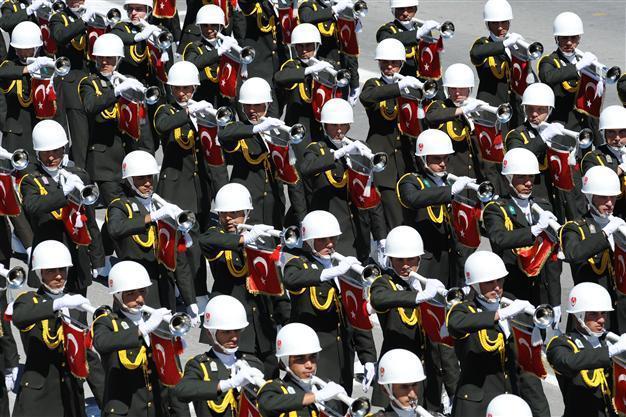Turkish Parliament OKs change on coup pretext article
ANKARA

The amended article says ‘The duty of the Armed Forces is to protect the homeland against threats and dangers to come from abroad, to ensure the preservation and strengthening of military power in a manner that will provide deterrence, to fulfill the duties abroad,’ with a greater emphasis on external threats. DAILY NEWS photo, Selahattin SÖNMEZ
Parliament has amended an article believed to have provided historical legal justification for military coups d’état in the country, which saw four governments overthrown between 1960 and 1997.The current government, too, narrowly escaped from the Turkish Armed Forces’ (TSK) intervention in 2007 when military forces issued a warning against the candidacy of then-Foreign Minister and current President Abdullah Gül, mainly because his spouse wears a headscarf, which is seen as an alarming symbol of fundamentalism by hyper-secularists in society.
The amendment was adopted by Parliament on July 13, on the last day of the past legislative year.
Despite having taken important strides in normalizing civilian-military relations particularly through EU-inspired reforms since coming to power in the 2002, the ruling Justice and Development Party (AKP) had so far shied away from taking any concrete step to amend the articles, number 35 of the Internal Service Code of the Turkish Armed Forces (TSK).
“The duty of the Armed Forces is to protect and safeguard the Turkish homeland and the Turkish Republic as stipulated by the Constitution,” the former Article 35 stated.
With the amendment, the phrasing now states that “the duty of the Armed Forces is to protect the Turkish homeland against threats and dangers to come from abroad, to ensure the preservation and strengthening of military power in a manner that will provide deterrence, to fulfill the duties abroad with the decision of the Parliament and help maintain international peace,” thus putting greater emphasis on threats from outside.
Another article of the same internal service code defined military service as the “responsibility to learn and conduct the art of war in order to protect the Turkish homeland, independence and Republic.”
With the amendment, it has been altered to limit its extent by defining the military service as “the responsibility to learn and conduct the art of war.”
Prime Minister Recep Tayyip Erdoğan’s AKP tabled the bill in late June, amid a spate of anti-government protests during the Gezi Park unrest, which Erdoğan has blamed on a conspiracy against his democratically elected government. The protesters have been airing discontent with what opponents have said is Erdoğan’s increasingly authoritarian style of governing and moves to impose his conservative and religious views on society.
The vote also came at a time when Turkey has spoken out against the Egyptian military’s overthrow of the country’s president, Mohamed Morsi, with whom Erdoğan had formed an alliance.
















